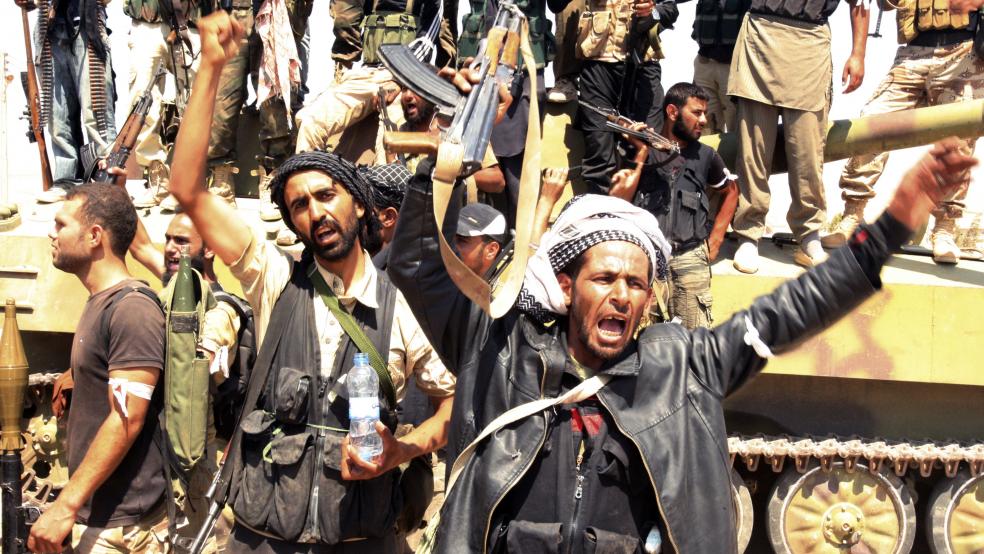As new, horrifying  footage of victims of chemical attacks emerged, European nations have reportedly split over the U.S. push for military action, with only France and Denmark supporting independent strikes. Germany, which previously had backed strikes, said it could no longer do so without a U.N. mandate. Saudi Arabia, meanwhile, said it would back action to stop Syrian President Bashar al-Assad.
footage of victims of chemical attacks emerged, European nations have reportedly split over the U.S. push for military action, with only France and Denmark supporting independent strikes. Germany, which previously had backed strikes, said it could no longer do so without a U.N. mandate. Saudi Arabia, meanwhile, said it would back action to stop Syrian President Bashar al-Assad.
Obama administration officials continued to bang the drum for military action against Syria last week, with Secretary of State John Kerry attempting to drum up support from Europe and the Middle East.
But the importance of Kerry’s foreign dealings pales in comparison to what set to happen in Congress later this week. Skeptical lawmakers are expected to vote on a resolution to authorize military force: Right now, the Senate is expected to pass it, while the House appears likely to reject it, forcing Obama to decide if he would strike without congressional approval.
Some of the Houses’ resistance to Obama is political. But many lawmakers have raised genuine concerns about Assad’s opponents, collectively known as the rebels.
As part of his campaign to unseat Assad, Obama has pledged to continue to arm the rebels who are fighting him. But unlike other civil wars, there are no clear “good guys” in the Syrian conflict: If Assad goes, the people who replace him and his cronies might be just as hostile to American interest as Assad.
The rebels are a nebulous group, and their members swell and sink based on their success in the war. But according to security analysts, they fall into three distinct groups. And there’s a good chance that none of them would be open to friendly relations with Washington after the war.
In fact, Obama just might be arming the very people that would make an already perilous Middle East unstable. They are:
• The Free Syrian Army: There are approximately 60,000 fighters in this group, many of whom defected from the military. They claim to be sectarian, but they also seem unwilling to compromise with other rebel groups, setting the stage for conflict if Assad is defeated.
This group is generally considered the most militarily capable, unsurprising given the background of its members. Sen. John McCain spoke with their leader, Gen. Salim Idriss, and came away impressed. "General Idriss and his fighters share many of our interests and values. They are fighting our common enemies every day in Syria," McCain, who is one of the president’s primary backers, said recently. "They are our best hope for a moderate Syria free from Assad, Iran, and al-Qaeda."
• The Syrian Liberation Front and the Syrian Islamic Front: These groups, who number roughly 37,000 and 13,000 members respectively, are both Islamists and at odds with the Free Syrian Army. The areas these armies control have been targets of Assad’s alleged chemical attacks.
Both of these groups remain wild cards, but given their tendency toward conservative Islam, they’d likely be at odds with the United States if the rebels prevail. There are also rumors that the group has been infiltrated by al Qaeda elements.
• Jabhat al-Nusra: This group is the smallest, reportedly numbering less than 5,000 fighters since it formed in early 2012. But these fighters are the fiercest in Syria, as they are veterans of the Iraqi resistance against the United States during the second Gulf War.
They have also pledged allegiance to al Qaeda in Iraq recently, making them an avowed enemy of the United States and Israel. Reports this weekend implicate them in an attack against three Christian villages.
There are a number of other small factions fighting on the side of the rebels, but these three are the most likely to determine Syria’s fate if Assad is deposed. Their views differ so much that it would be difficult to determine a peaceful transition of power, let alone a government that would invite friendly relations with Washington.
“The conflict has become increasingly sectarian, with the conduct of the parties becoming significantly more radicalized and militarized," the United Nations said in a report earlier this year.
For many lawmakers, this appears to be the primary reason to deny action against Syria. The Arab Spring showed how badly the West understood Middle East upheaval. They appear to be more comfortable with the villain they know then the one they don’t.
“The last thing I want to do is arm rebels,” said Rep. Richard B. Nugent (R-Fla.) said recently. “I want to make sure our sons and daughters are not in harm’s way.”




